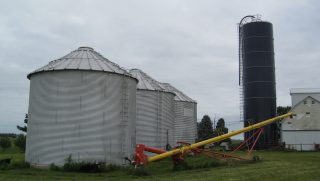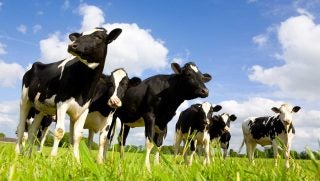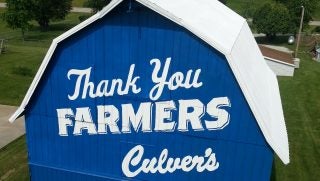Annually, heat stress in pigs costs the U.S. swine industry an estimated $481 million in revenue losses.
To address animal welfare and pig productivity, a team of university and Agricultural Research Services scientists has created a smartphone app called HotHog to help predict heat stress in pigs.
HotHog taps into local weather data to predict the relative comfort or heat stress levels of pigs on an hourly, daily, or weekly basis. Swine producers can then use this information to take pre-emptive measures, like ensuring plenty of drinking water, cooling the pigs with fans or mists, and limiting transport to early morning hours.
While producers have always been keen on finding new ways to keep pigs comfortable and cool, researchers such as Jay S. Johnson out of ARS’s Livestock Research Unit in Lafayette, Indiana, says that in the face of climate change, during summer months and in the tropical regions, keeping temperatures down is even more important than ever.
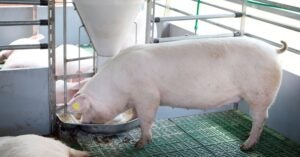
Pigs are especially vulnerable to heat stress because they cannot sweat. In modern production settings, pigs cope with heat through panting, while the caregivers adjust ventilation rates, utilize sprinklers, and ensure free access to abundant, cool water for the animals to drink. Without such measures, pigs may start to eat less, grow slower, produce less lean muscle, produce less milk, and experience other health, productivity, or fertility problems.
Gestating sows are among a swine herd’s most vulnerable members, and when heat-stressed, they may give birth to fewer and smaller piglets. Heat-stressed gestating sows may also give birth to in-utero heat-stressed piglets that have a greater risk of health and other complications in their postnatal life.
Available on Apple App Store and Google Play Store, HotHog is the first decision-support tool of its kind to predict thermal stress based on behavioral and physiological data collected from heat-load studies of swine — and more precisely, from non-pregnant breeding females and mid- and late-gestation sows. This is what differentiates the app from other decision-support tools that are now available to swine producers.
“Additionally, many thermal indices currently in use were originally developed for use in non-swine species and may not accurately predict thermal comfort and stress in pigs,” added Johnson.
The developers say that the app will work with both iPhone and Android smartphones. HotHog includes geographic user settings, current local time, and weather including temperature forecasts color-coded to one of six thermal states (or categories) in swine: cool, comfortable, warm, mild heat stress, moderate heat stress, and severe heat stress.
Clicking on the pig icon, for example, describes physiological and behavioral signs associated with the thermal state predicted to affect the herd’s sows. Clicking on a fan icon displays a page titled “Management Observations and Mitigation Options,” which provides recommendations for ensuring the sows’ comfort based on the thermal state that the app has predicted.
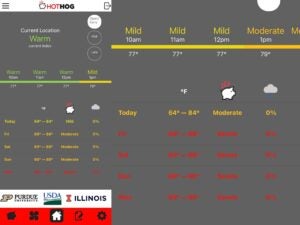
Another icon resembles a gear. “It takes the user to a settings page where they can edit their individual profile and set specific preferences, such as switching between dark and light mode or specifying whether temperatures are presented in Fahrenheit or Celsius,” Johnson explained. “Users can also find information there on how the app was developed, considerations for use of HotHog, and options to report problems with HotHog or ask specific questions.”
Future updates to HotHog will include Spanish translation, push notifications, and thermal predictions for boars, nursery pigs, and growing-finishing pigs, among other groups. The app will apply these updates through the Apple App Store and Google Play Store updates, Johnson said.
The HotHog app was developed, tested, and released with collaborators from the University of Ill. at Urbana-Champaign; Purdue University in West Lafayette, Ind., and the Oak Ridge Institute for Science and Education in Oak Ridge, Tenn.
»Related: Study: Heat stress in dairy cows damages health of calves
